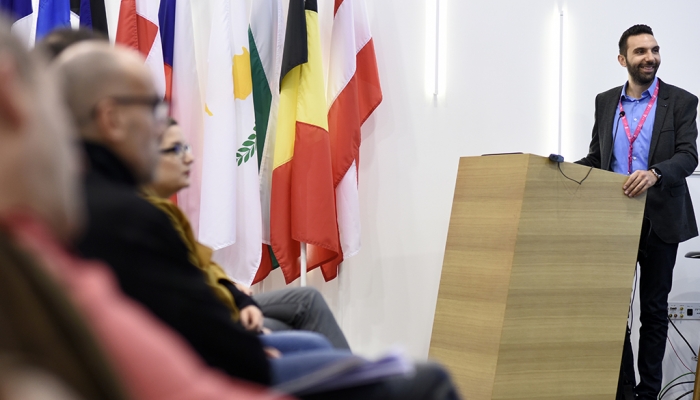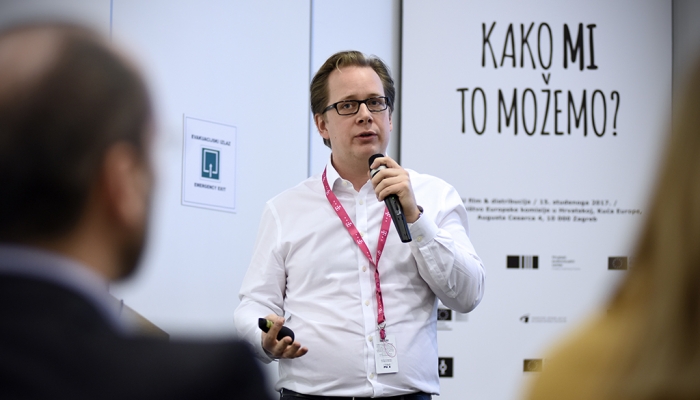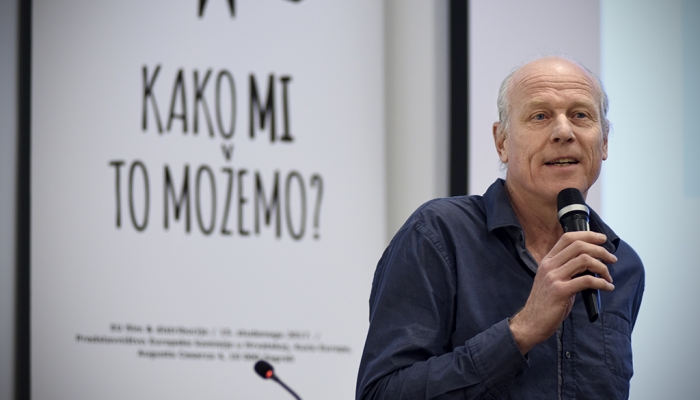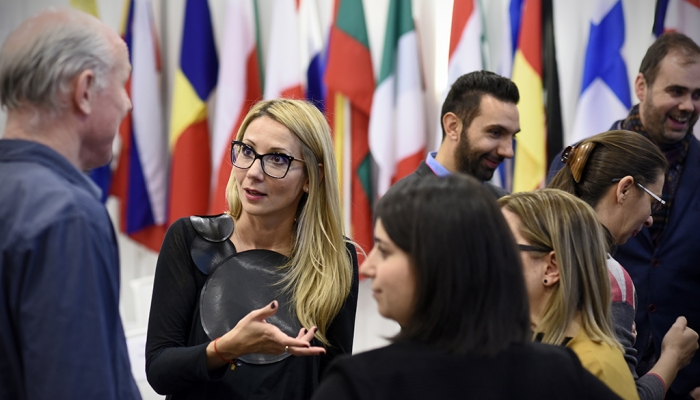‘How can WE do it?’: Innovative and creative digital distribution




The fourth and final panel discussion of the ‘How can WE do it?’ event held at Europe House and organized by Creative Europe Desk – MEDIA Desk Croatia, as a part of the 15th Zagreb Film Festival, discussed trends and innovations in digital distribution.
The MEDIA Sub-programme, through calls and guidelines geared toward online promotion of European audiovisual works, is aiming to come to innovative and creative solutions. This was the main topic of discussion mediated by Martina Petrović, head of Creative Europe Desk – MEDIA Desk Croatia, with panelists Kiril Gjozev, owner and founder of Cineflix, Philipp Hoffmann, founder of RUSHLAKE MEDIA GmbH and Vincent Lucassen from Under the Milky Way. The abovementioned all used funding from the MEDIA Sub-programme for online promotion of European audiovisual works and used their experiences as examples of how digital distribution can be creative and innovative. Martina Petrović stated that MEDIA’s annual budget for 2018 is almost 111 640 000 million EUR, of which 38.76% goes towards calls for distribution, especially for online promotion of European audiovisual works and VOD services.
Kiril Gjozev, founder and owner of Cineflix (Skopje, Macedonia), noted that this year his firm secured funds amounting to 84 750 EUR from MEDIA Sub-programme. Last year they received 58 000 EUR. With these funds, and in cooperation with Croatia (Radar, Karlovac) and Albania (Tirana Film Institute, Tirana), they developed a project in two parts. The first includes screening films simultaneously at two festivals, as well as on the VOD platform which Cineflix was the first to develop in the region and includes 13 South Eastern European countries in which each individual film is released. The second part of the project includes Croatia, and is based on releasing films simultaneously in cinemas and via VOD. The film which was distributed in all three countries and included subtitles was the Dutch film Little Gangster. He added that they are pleased with both parts of the project and believe that they were able to demonstrate how it is possible to be successful in this part of Europe. This year they increased the number of films they screened at festivals, via VOD platforms, and in cinemas. They also plan to develop an app dedicated exclusively to children’s films. The pilot project will launch in Skopje, and the goal is to connect all cinemas and screening times of children’s films in Macedonia via the app. Furthermore, in cooperation with Art Cinema Skopje, which screens European films, they are also working on simultaneous screenings of films in cinemas and on VOD platforms. Finally, they plan to invest MEDIA funds into simultaneous screenings on numerous platforms which includes screening films in cinemas in all three countries and via two VOD platforms: Cinesquare and Pantaflix (Germany).
The second example of successful online distribution, Cinema On Demand, was presented by Philipp Hoffmann (RUSHLAKE MEDIA GmbH) from Germany. Considering the large number of VOD services currently targeting the German market, as well as offering the same content, it is difficult to find quality content. They tackled this issue using a tried and true method of reducing the number of options and directing choices towards local cinema screenings. The cinemas operate locally and are familiar with the habits and wishes of their audiences which they use to base their selections. Considering all of these factors, Hoffmann says they have selected the best of what the cinemas and VODs have to offer and joined them without viewers being deprived of the big screen viewing experience – in other words, they have connected offline and online experience. Their platform makes this connection by implementing an icon on the cinema’s website offering the user the possibility to watch films on the VOD platform (so-called ‘shop’) simply named European Cinema & VOD Initiative. They do it across Europe, and in Germany this platform offers 5 to 10 films simultaneously which are not only chosen by the end user but by the cinema operator. RUSHLAKE MEDIA GmbH takes on all negotiations and logistics regarding rights and payment, and the content is no longer available once a time period has passed. The results reflect the size of the German market as well as the audience: 4 to 6 (sometime more than 10) percent of viewers who search the cinema’s site for available films, buy it in the end. That rate of sale is at best 1 %. Considering they own the VOD platform they can monitor absolutely all parameters and in that way offer insight to cinemas on their audiences. The same platform was recently launched in France and the Netherlands. Hoffmann concluded by saying that the biggest misconception regarding VOD services is that by simply being available on the platform the film generates viewership. But what European Cinema & VOD Initiative does is they choose a film and make sure people really do watch it.
The Under the Milky Way project was presented by Vincent Lucassen (Vienna). Vincent joined Under the Milky Way in 2011, and selects films for Germany, Austria, Switzerland, Eastern and Southeastern Europe, Russia and Turkey. They are specialized in Art House films and documentaries and are present in the American market (their plan is to expand to Japan) where precisely these kinds of films are needed. They are working at a global level with iTunes, Microsoft, Sony, Google and Amazon, and function as a bridge between film and VOD platforms. They currently have 4000 films (a number reached within 5 years) and promote them globally. That is the first level. Equally important is that the film is visible on these platforms and that people want to buy it. For that reason they have started grouping their films (five or six per group with a common theme), and have asked the platforms that release them to group and promote them in the same way. They also offer subtitles and a marketing budget. Last year they offered 44 films from 13 EU countries which were distributed in 90 countries and in 18 languages. Lucassen emphasizes that the challenge is to reach other platforms which do not operate globally considering the European Commission would like for them to work with smaller, national platforms. Lucassen says they intend to expand to undeveloped markets and their job is to raise awareness of each European film by taking advantage of global interests in certain themes – refugees, financial crises, etc.
To conclude, Martina Petrović noted that it is necessary to go beyond the usual, routine mindset and adapt to trends and innovations within digital distribution, while focusing on innovative business solutions which can be implemented and best function within the context of small countries, in other words countries with low production capacities.
Cover photos: Kiril Gjozev; Philipp Hoffmann; Vincent Lucassen; Martina Petrović
(*Photo credit: Nina Đurđević)
